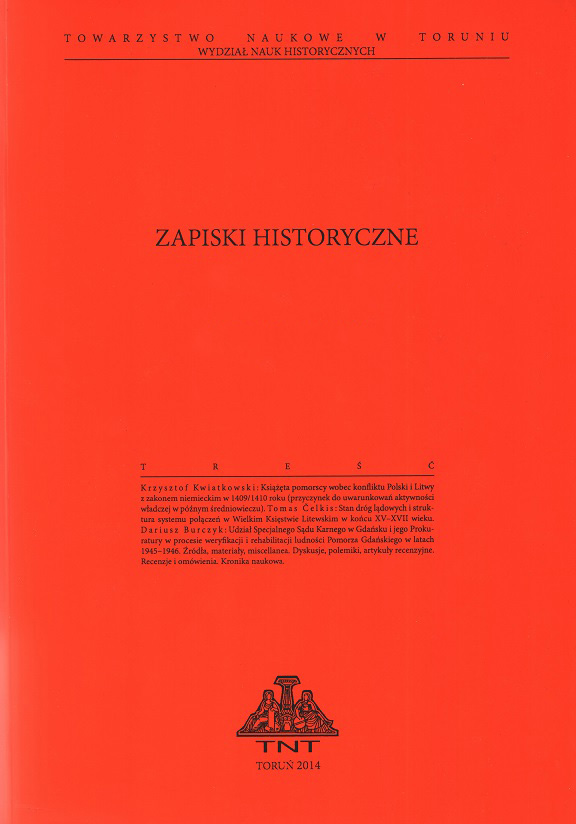Prussian Registers of the Proscribed/Outlaws as a Source for Research on Violence in Everyday Life of a Town in the Late Middle Ages
Prussian Registers of the Proscribed/Outlaws as a Source for Research on Violence in Everyday Life of a Town in the Late Middle Ages
Author(s): Paweł JeziorskiSubject(s): Cultural history, Social history, Middle Ages
Published by: Towarzystwo Naukowe w Toruniu
Keywords: proscription; banishment; punishment; Prussian towns; late Middle Ages; court registers; town books; town judiciary; State of the Teutonic Order; Chełmno law; Lübeck law
Summary/Abstract: The main purpose of the presented text is an attempt to demonstrate the usefulness of the registers of outlaws established in late medieval Prussian cities for the research on the issue of the presence of violence in the everyday life of Prussia’s inhabitants. The primary sources used in the article consisted of preserved registers from Prussian cities governed according to the rules of the Chełmno law (Bartoszyce, Chełmno, the New Town of Toruń) or the Lübeck law (the Old Town of Braniewo, Elbląg). The starting point for further analysis was the discussion of the basic differences between proscription (administrative coercion and procedural measure, aimed at forcing the accused to appear before the court) and banishment (temporary or lifelong exile from a specific territory). What the author also addresses in the text is the question: how the proscription, by the virtue of the Lübeck law, acquired a much more repressive character (exhibiting features typical of punishment). Subsequently, the characteristics of the preserved Prussian registers of outlaws (14th–16th centuries) were analyzed in terms of their usefulness for research. Attention was drawn to the shortcomings of these primary sources, primarily to their incompleteness (to a greater or lesser extent); the reasons for this situation were presented as well. Given these shortcomings, an attempt was made to demonstrate the usefulness of the preserved registers in historical investigations. It was pointed out that they could be used for research, e.g. on the origins of conflicts among specific socio-professional groups, the character of women’s participation in acts of violence, or the attitude of municipal authorities towards cases of violence against representatives of the social margin. The article also refers to forms of verbal aggression and physical violence, also with the use of dangerous tools.
Journal: Zapiski Historyczne
- Issue Year: 84/2019
- Issue No: 3
- Page Range: 7-29
- Page Count: 23
- Language: English

